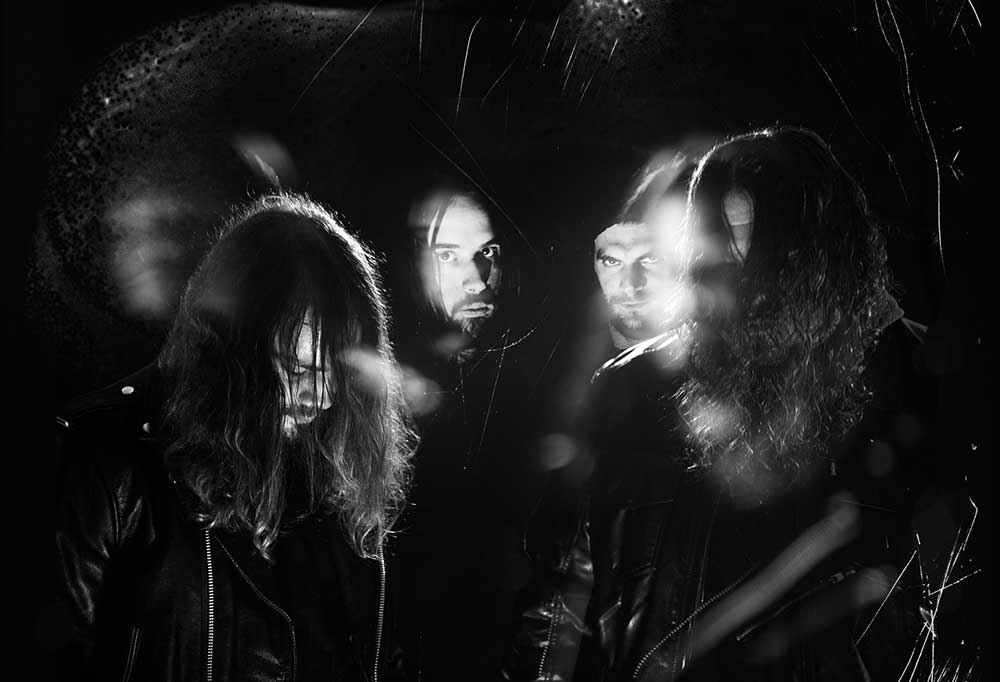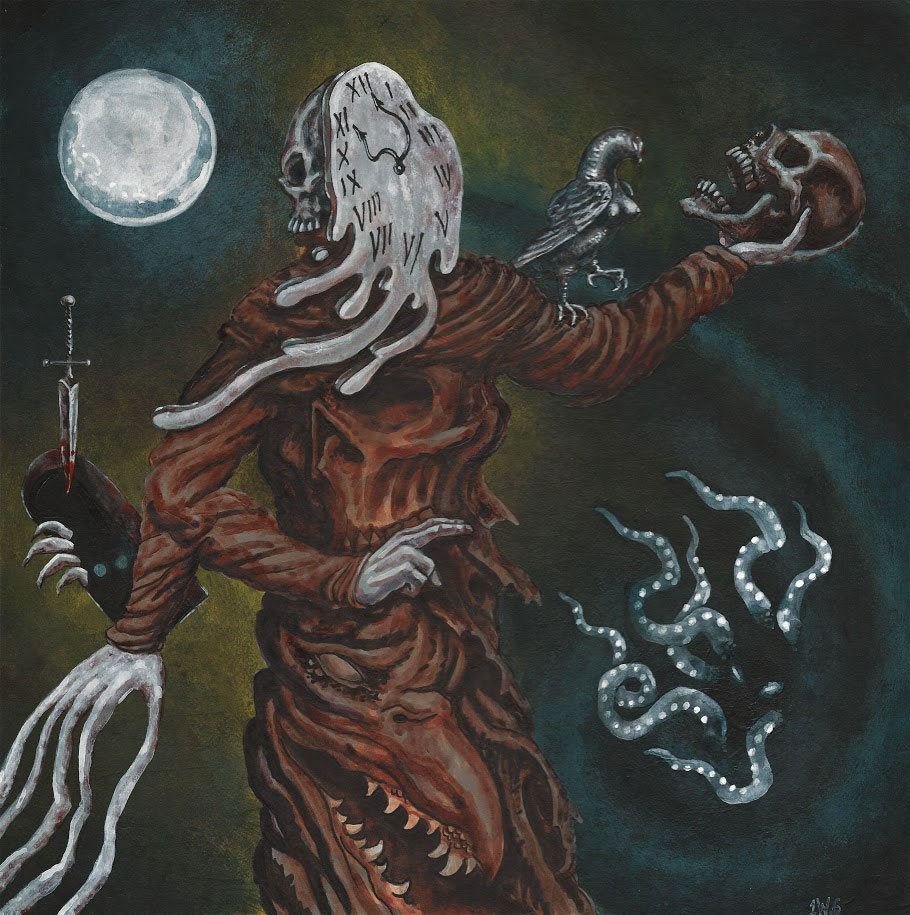Chaos Moon
2017-09-20
by Niklas Göransson
A conversation about ego and artistry with Alex Poole from American black metal band Chaos Moon; of creative blockages and dissolution thereof, and how the greatest treasures lurking in the void offer supreme peace and liberation.
– “Eschaton Mémoire” represents something greater to me than my past work. Not because it’s expertly crafted or an album I’d consider my personal masterpiece, but as a result of its extensive writing process – I finally found the focus I’d been looking for. CHAOS MOON has been an out of control experiment over the past thirteen years, for better or worse.
As in, without direction?
– As in, no focus. Composing music which reflects nothing but the sentiments felt in that specific moment, without tangible and cohesive goals – only a desire to create without rules. There’s nothing wrong with that approach but in some regards, and without really knowing it, I was always longing for discipline. I still retain the previously mentioned freedom; however, a healthy balance is key.
Alex says he went through three manifestations of what ultimately became “Eschaton Mémoire”. The first version, on which he handled all instruments by himself, was almost finalised before ultimately being rejected. The subsequent reworked material made it all the way into a studio where it was fully recorded, mixed, and mastered – and then scrapped.
– Leading us to the third and final edition, but with long-time collaborators added to the line-up. We began our final writing period in the winter of 2016 and completed it in August this year. Our work was given the very broad and genre-appropriate theme of death worship, with an emphasis on conquering mortal fear. At least that’s how we arranged the music. The concept truly ignited a fire in us and so we took our first steps into Mach III of this fourth CHAOS MOON full-length.

Alex has previously stated that EMPEROR’s iconic debut, the 1994 “In the Nightside Eclipse”, essentially laid the foundation for his musical life. Listening to his most recent output, I’d say this influence remains very much a factor.
– Speaking broadly, I think what really gets me is the sense of mystery captured by that record. I’m unaware of any other album which better portrays the raw essence of night and mystique of the unknown. Confronted with such profound feelings at a young age, it could very well have been the first time I experienced an altered state of consciousness.
Have you been able to recreate this in your own music since?
– I don’t know if I can, but either way it’s not really for me to say. My music tends to be very personalised bookmarks in the chapter of their creation. There’s no mystery for me there; I know the whole story and underlying process. Listening to it evokes vastly different feelings, some are immensely powerful but on an entirely different emotional spectrum. I believe it has to be someone’s ‘right place at the right time’ for them to have such an experience, you know?
Rather than emulating the actual music, it’s more the sensory impact “In the Nightside Eclipse” had on him that Alex tries to channel.
– I’ve been passionate about music for as long as I can remember and loved many songs, albums, and bands prior to coming across EMPEROR – but I’d never felt transformed before. Quite an experience. I can still recall those moments sometimes, they help me realign my intent; especially when creativity isn’t working for me.
There was a time when this artistic realignment was denied to him. In fact, CHAOS MOON was at one point discontinued following a nasty bout of writer’s block. Such ailments are to me the fabric of nightmares.
– Hah, don’t fear the writer’s block – as a creative individual, you’ll most likely experience it at some point. It’s fleeting, just like everything else in life. You know, I advise everyone to look forward to the challenge, it might even force some new habits into the artist. I definitely learned to be patient with creativity and was reminded not to judge my work against that of others. Take what you think you know and look beneath it, the path you’re walking isn’t the only path there is. These things helped me overcome years of on-and-off blockage.
Alex adds that he’s also investigated other therapies and found resonance with British musician Brian Eno’s Oblique Strategies, a deck of cards that offers various cerebral challenges meant to shift the creative process into a more analytical mode.
– My biggest fear is getting comfortable. I think undergoing extremes, or at least some sort of struggle or drive, is key for genuine art. Mental illness, religious and spiritual experiences, trauma, death, birth, love, and so forth. Losing touch with real emotions and creating out of habit, boredom, or a sense of obligation – this is what absolutely terrifies me. I’d rather put out one sincere piece of art and be stricken with lifelong writer’s block than keep going until I’m producing bland mud.
Speaking of which, Alex has declared contemporary black metal to be a ‘culture of recycled identities and sounds’.
– I too am guilty of this – we all are in this genre. It’s curious how certain musicians purport to be some of the most liberated, ingenious, or spiritually inclined beings since the great philosophers and shamans of our time – yet musically, everything is a diet version of whatever bandwagon they’re currently on. I don’t really intend this to be an attack on anyone’s creativity but I think being more honest about our artistic intentions, rather than simply trying to fit in, would go a long way in terms of moving forward.

Matters of ego and the dissolution thereof are professed interests of my interviewee. Is it advisable for a musician to fully renounce his ego, I wonder? It could be argued that a true artist excels from an obsession of transcending mediocrity and rising above the rest – a drive likely to at least in part be fuelled by the ego, regardless if prime motivation is a passion for the art rather than pedestrian praise.
– We cannot relinquish our egos. But, I think that in some cases, art can reflect on the ego negatively. If art is too self-aware, in the sense that the artist strives for petty goals, those intentions become apparent. Say, a rip-off versus an earnest celebration or acknowledgement of musical influence. Or a desire to garner recognition and credibility as opposed to personal satisfaction and growth. As I’m sure most are aware, music with shallow intentions always ends up forgotten. I’m not an innovator or someone who’s above all that I rail against, but I strive for these things. I don’t care who likes or dislikes what I do.
Then why bother releasing anything in the first place?
– I’m often puzzled by the very same thing. I subscribe to the artist cliché of making music only for myself. But making it available, I don’t know – perhaps the desire to make a statement? Maybe this is my deep intent. As I keep writing music, I gradually reveal more about myself, to myself. Why do I write as I do? Why did I make the choices I’ve made during my ‘career’? Only by lifting the veil can one’s true intentions be fully understood.
Alex explains that when he speaks of parting veils, he is in fact referring to the ego. Not in a sense of self-importance but the superego; a Freudian term referring to the moral component which regulates an individual’s personality, principles, and prohibitions. This is what dictates the so-called internal monologue. Therefore, he says, every word and notion should be questioned because it’s easy for the mind to distort reality as perceived through one’s own personal filters. As the old saying goes; ‘you are not your thoughts’.
– Psychedelic use, meditation, dreams, and so on allow us to peer behind the veil, assuming we’re able to fully let our selves go. But you’re only granted brief glimpses, I think. We are human, we’re designed to function in a specific way – physically and psychologically. The mind needs boundaries in order to be cohesive and functional but when in an altered state of consciousness, we can see how the underlying mechanisms of thought-processes are merely by-products of our environment and genetics. Backtrack far enough into the source of judgements or thoughts and you’ll begin recognising your own biases, attachments, and fears. As older schools of thought called it; Maya. Nothing is what it seems.
Maya is a Sanskrit term with several connotations in both Hinduism and Buddhism. It’s commonly used to describe the existence we dwell in as some manner of magical cabaret, an illusion where things which are not real appear as if they are.
– This was the greatest realisation in terms of pushing myself forward. The understanding of where each element of my interaction with the environment derives from, and whether those behaviours were healthy or toxic. It’s all a by-product of something else. Before indulging in psychoactive substances, I would alter my interpretation of reality by using my environment and sense of self. I doubt these writing experiments came across very much in my early artistic output but they definitely brought constructive changes to various perceptions of mine. However, my first experience with psilocybin mushrooms put an end to these methods.
In a conversation prior to this interview, Alex said he employs psychedelics as ‘methods of creation and destruction’. Given the genre his compositions are geared towards, I’m curious if this devastation entails some form of black metal self-harm, or if it’s more the eradication of false notions and mental detriment.
– Self-harm is only beneficial when trying to obtain certain states of thought, which I’m well over and done with by now. This ruination occurs on a much deeper level – in a revitalising, forest fire-like fashion. It’s like booting the computer into safe-mode in order to remove malicious and invasive software. This is of course only a small step because to prevent the virus from reinstalling itself, you must remedy your behaviour in everyday life. The process as a whole is a huge influence on my creativity, I think it’s the only way I know how to accurately describe what takes place. I write music based on my experience in the many rooms that inhabit my mind. So, in a way, there are multiple levels of creation and destruction occurring – a ripple effect.

Alex used to be what he describes as a ‘less spiritual sceptic atheist type person’. Psychedelic use, he explains, is the ultimate introduction to the possibilities of there being something greater than what one experiences with mundane senses. A commonly used term for such substances is ‘entheogens’, the word derives from Greek and means ’generating the divine within’. An entheogen is a substance – chemical or naturally occurring – used for religious ceremony or metaphysical exploration.
– The methods in which they were used during my younger days were fledgling attempts at connecting to my higher self. Without this introduction, I doubt I’d have gotten involved with the lifelong work of changing my behaviour. Psychedelics are merely supplements for this though, they don’t represent a fraction of my combined work – they are keys, not the solution itself. While doors might be unlocked for you, stepping through them is a task left up to your sober self.
Alex says the frequency of his consumption decreases the more astral mileage he puts behind him. The need or desire for further use has become strictly for constructive or creative purposes, as opposed to mere recreation.
– My experiences are far more intense now, even with smaller dosages, which takes the element of ‘thrill’ out of it. They drag me straight into the massive cavern of my self, where I’m confronted with archetypes representing aspirations and fears – they pose riddles which I attempt to solve. But this type of inner exploration is not substance-dependant; a great many philosophies and spiritual systems all strive for similar results using different methods, wouldn’t you say?
Indeed. Revisiting the previously utilised Vedic comparison; in order to commune with the divine spirit, the Hindu connects to atman, the inner self, by way of meditation. The point being to bypass the ego – or lower self, to remain in the same nomenclature – by watching one’s stream of consciousness from a distance; observing transitory emotions and thoughts without attachment until separated from that which is being watched. Becoming the witness, scrutinising the self without the blindfolds of judgement from the perspective of universal connectedness. Though admittedly absurdly simplified, this approach doesn’t sound too far off from commonly reported entheogenic experiences.
– My greatest accomplishments all stem from post-trip implementation, long after any effects have worn off. I can experience beautiful and wondrous states on LSD over and over again, but in retrospect they end up as productive as a roller-coaster ride if poisonous behaviour is resumed afterwards. I don’t believe these activities alone do much good if you choose to simply dwell on them without further work or investigation. Coming to terms with all this took me a long time, realisation only came after I endured a series of traumatic events in later life. It led me to Buddhism – or rather, I was given a set of keys and this was the door I chose to unlock.
I’m reminded of an old interview with Dr. Rick Strassman, author of DMT: The Spirit Molecule. In his early twenties, he spent several years training in a Zen Buddhist monastery. He had a theory that there’s significant similarities between the effects of entheogens and states enabled from a lot of meditation, and wondered how many of the monks might have had their first glimpse of enlightenment through the psychedelic experience. His findings were astonishing; about ninety percent of those he spoke to. Many confided in him that use of mescaline, psilocybin, LSD, and similar substances had been pivotal in their decisions to become Buddhist monks. They wanted to develop that state of consciousness in a more manageable way; to sustain and infuse it with an ethical and moral lifestyle – a behavioural system that’s psychedelically informed in a way. Remaining on the same line of comparative reasoning, and glancing back to what Alex said about the importance of letting one’s self go under such circumstances, the words of late British philosopher Alan Watts ring true as ever:
The Buddha said that wisdom can come only from the abandonment of selfish craving, or desire. One who abandons that desire attains Nirvana, which means supreme peace and liberation. In Sanskrit, Nirvana means to blow out, to exhale the breath. Its opposite, desire, is to breathe in. Now, if you breathe in and hold it, you lose your breath; but if you breathe out it comes back to you. So the point is: If you want life, do not cling to it, let it go.
– Buddhism captures many of the elements I’ve experienced during trips. Separating yourself from the fleeting human game, abandoning attachments – letting it all wash away. It’s far more challenging but achieving the state of emptiness naturally is, in some regards, better than any drug.



